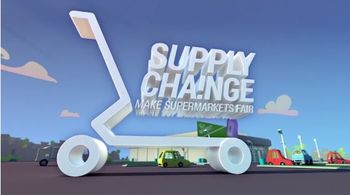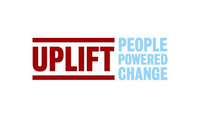
On 27th November 2015, activities for the SUPPLY CHA!NGE campaign culminated in a European Day of Action, celebrating the European Year of Development with activities in almost all European member states:
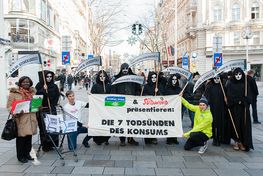
In Austria, Global2000 and Südwind, sent the “7 deadly sins of consumption” down Vienna’s biggest shopping street, namely “Cocoa - Child Labour”, “Oranges - Exploitation”, “Meat - Antibiotics”, “Palm-Oil - Land Grabbing”, “Tuna - Slavery”, “Food Waste” and “Environmental Toxins”. Following this ghastly parade on foot, activists offered shoppers an alternative, by distributing fair, regional and organic apples to onlookers in the Mariahilferstraße.
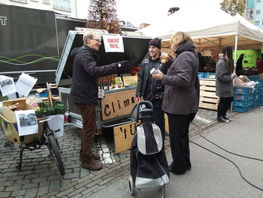
In Belgium, the European Environmental Bureau (EBB) staged a symbolic orange juice sale, ‘giving away’ juice for just 1 cent per serving in one of Brussels’ main railway stations. The ‘sale’ raised awareness of slave labor and the use of carcinogenic pesticides, through specially adapted packaging. A competitive angle was also introduced; in a second booth, apple juice made from local ‘leftovers’ was sold for 1 Euro a glass. Consumers were forced to make a real decision on how much they would support ethical supply chains!
In Bulgaria, Agrolink held a street quiz on the working conditions and the environmental impact of EU Cacao supply chain. Participants were asked to distribute money for the average chocolate price along the Cacao supply chain and compare their perception with the shocking facts. The activity was conducted by activists dressed up as cacao beans and chocolate bars, handing out leaflets. You can see impressions of the activities in this video (in Bulgarian).
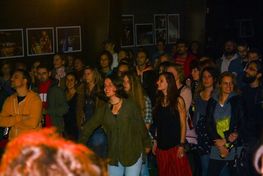
In Croatia, Zelena akcija organized a music festival, featuring young Croatian bands. For catering they teamed up with the ‘Foods not Bombs’ collective and provided free meals from thrown away vegetables, which were earlier collected on Zagreb green Markets. Furthermore workshops and TTIP and Solidarity Economy were offered.
In Cyprus, the Future World Center contributed to the SUPPLY CHA!NGE Day of Action with a pop up festival in Nicosia. Centerpiece of this activity was the launch of the Food Vision Photo Exhibition, showing the most interesting contributions of the European Food Vision Photo Contest.
In the Czech Republic, the petition for fair orange juice “Stop the Squeeze Out“ was launched together with the Supply cha!nge action clip, reaching over 60 000 people.
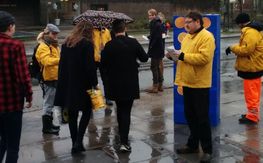
In Denmark, Aktive Forbrugere placed 2 meter-long orange juice cartons outside a large LIDL store in Copenhagen. The cartons had the “true” ingredient list printed on them, informing consumers of the excessive use of pesticides and the poor working conditions in plantations and factories. The activity was accompanied by distribution of campaign materials.
In Estonia, Mondo elaborated on the ‘Buy Nothing Day’ and highlighted responsible consumption in several article publications and other media activities. Furthermore, Mondo convened a seminar, discussing issues of sustainable consumerism with 70 participants.
In Finnland, Finnwatch asked critical citizens to take pictures of LIDL stores across the country in order to raise awareness to the company’s(lack of) transparency issues. The pictures generated by this campaign will be collected and handed over to LIDL in a picture petition in 2016.
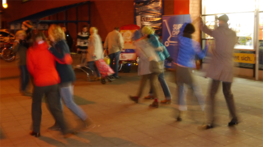
In Germany, Christliche Initiative Romero e.V. (CIR) organized activities in several German cities: In Berlin, a photo shoot in front of the Federal Ministry for Economic Affairs and Energy linked our efforts to the present regional debate on market concentration in the retail sector (a situation which threatens to worsen working conditions in both Germany and Brazil. In Münster, activists staged a flashHOP in the front of a local LIDL store, distributing our campaign materials to raise awareness among shoppers during ‘Buy Nothing Day’.
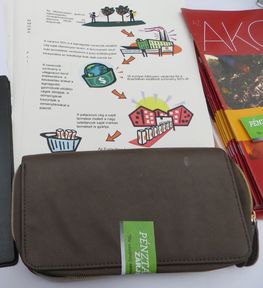 |
In Greece, Fair Trade Hellas organized a street performance in Athens’ most popular shopping street. The activity culminated in a public sreening of the SUPPLY CHA!NGE action clip. You can have a look at the activity on the Fair Trade Hellas youtube channel.
In Ireland, Uplift launched a digital campaign which focused on fruit and vegetable waste. Huge supermarket chains are only selling 'perfectly shaped' fruit and vegetables, creating huge waste, ramping up use of pesticides and contributing to inequalities for producers along the supply chain. The campaign focus is on pressuring Super-value, Tesco, Lidl and Aldi to give consumers the choice of wonky fruit/veg as well as 'perfect' fruit/veg.
In Hungary, Magyar Természetvédők Szövetsége distributed purse seals to ask passers by to reflect their consumption patterns on Buy Nothing Day.
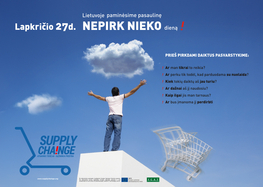
In Latvia, a public screening of the new film ‘True Cost’ has been organized by Zaļā brīvība. The film explores working conditions and the environmental impact of supply chains in the textile industry.
In Lithuania, the Environmental Centre for Administration and Technology (ECAT) launched a billboard campaign across the country.
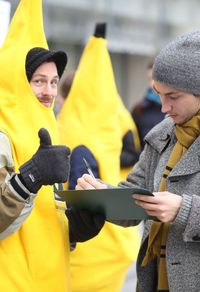
In Malta, Friends of the Earth Malta subverted conventional consumption patterns by arranging for a surge in volunteer work: On the 27th of September, all citizens were invited to pledge to devote a few hours of their time by volunteering for their favorite NGO in exchange for selected goods, sponsored by fair-trade outlets and others.
In Poland the European Day of Action was celebrated with activities in Cracow and Warsaw: Activists of Kupuj Odpowiedzialnie dressed as bananas and broke through a wall of cardboard boxes, symbolizing supermarket power and excessive consumption.
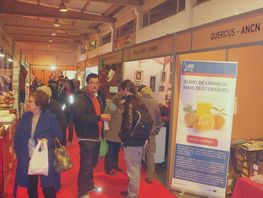
In Portugal, Quercus broadcasted a "Green Minute" on RTP2 national television, featuring the petition for fair and sustainable orange juice in supermarkets. Also, a big campaign in Facebook was launched for people to sign the petition. In addition, Quercus presented the Food Vision photo exhibition on FAG, a gastronomy fair attracting 25.000 visitors. Visitors to the exhibition were offered sustainable orange juice and asked to sign the petition.
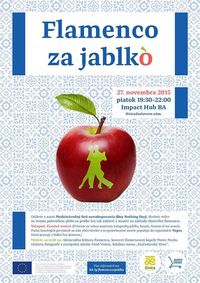
In Romania, activists paraded the streets of Bukarest with a very special exhibition: The most inspiring contributions to the FOOD VISION Photo Contest were presented on shopping bags to spread the word about the campaign on the open street.
In Slovakia, Zivica invited guests to an evening of flamenco lessons, requesting an apple or another piece of fruit in lieu of an entrance fee. In the spirit of the ‘Buy Nothing Day’, the flamenco lesson was therefore not bought but traded for the fruits. The donated food was then given to a partner NGO which is working with homeless people in Bratislava.
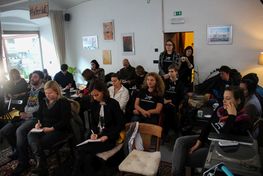
In Slovenia, the FOCUS Association for Sustainable Development convened a rally in the streets of Ljubljana with anti-commercials, advocating sustainable consumption. In the spirit of the ‘Buy Nothing Day’, these activities culminated in a “Sewing Flash Mob”, advocating reuse and recycling. In preparation of the rally FOCUS hosted a workshop on the issues of supply chains.
In Spain, RETS launched a Spanish language campaign online to raise awareness about storebrand issues.
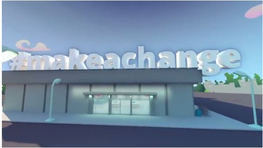 |
In Sweden, Swedwatch published 'Trapped in the kitchen of the world', a study based on research by Swedwatch and SUPPLY CHA!NGE partner Finnwatch. The report investigates the situation of migrant workers in Thai chicken industry, that frequently face labour and human rights abuses. Thailand is one of the major producers for EU poultry products. In 2014 270 000 tonnes of poultry products have been exported from Thailand to the EU.
In the United Kingdom, Think Global launched a Europe-wide Twitter campaign, spreading the word about the petition digitally and ask people to #makeachange!
